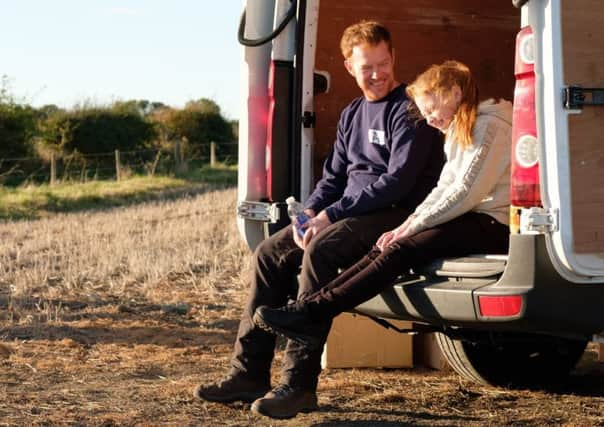Sorry We Missed You: Real-life workers feel powerless as time off is lost – Grahame Smith


The new Ken Loach film, Sorry We Missed You, shines a dramatic light on an everyday problem for millions. Namely, that new ways of organising work are robbing workers of their time, reaching into their domestic lives while putting families under strain.
Although these forms of work are not new, they are becoming more widespread. New technology is being used to squeeze every moment out of every working day. Too often it is also squeezing any joy out of people’s lives. Workers are increasingly encouraged to compete with each other, not just for wages, but for time and control.
Advertisement
Hide AdAdvertisement
Hide AdAs work becomes more intense and more individual, the best way for workers to regain some degree of control is to work together to achieve it.
Over recent years, the trade union movement has begun to apply itself to these challenges. How can workers co-operate together to improve their work in these new precarious work situations?
In 2015, the STUC launched the Better than Zero campaign which tackled zero-hour contracts, low wages, and zero rights and respect in the workplace.
Aimed primarily at young workers in precarious jobs in the hospitality and service industries, the campaign tactics of flashmobs, stunts and creative demonstrations garnered press attention with hundreds of people getting in touch with the campaign about their own employment conditions. The campaign inspired confidence in young people, who didn’t want to be classified as victims just because the way they work is described as precarious. Instead, the campaign has taught them how to challenge the precarious working environments by joining and becoming active in trade unions.
Precarious work may be prevalent in sectors where high numbers of young people work, but Loach’s film showed that precarious work is affecting older people in delivery and home care too.
A wake-up call about exploitation
That is why the STUC research report, “Time, Control, Trust: Collectivising in Precarious Work”, launched to coincide with Ken Loach and Paul Laverty’s film, spoke to workers from hospitality, retail, creative industries, and distribution.
The report leaves no room for doubt. Precarious work has penetrated into daily life in Scotland. It is a wake-up call to all who have become complacent in the face of contemporary exploitation. Low pay is still a big problem. But these workers also identified the themes of time, control and trust as being major factors in their working lives with significant impact on their personal lives.
Many workers identified that the lack of time they have to themselves, to socialise, rest or do anything other than think about working was increasingly limited. When coupled with low-paid work, this is particularly acute as people take on more hours or spend time trying to find a second job to make ends meet. This is leading to time itself becoming a commodity.
Advertisement
Hide AdAdvertisement
Hide AdThe report highlights that unions should push ‘time’ further up the bargaining agenda. This can include issues such as rostering at work, travel time and reasonable time off for family duties. In the longer term, campaigning for a four-day week or using technology agreements to ensure automation supports more leisure time for workers will come to the fore.
Pressured to breaking point
A clear consequence of precarious employment is a sense of powerlessness within workers. This sense of powerlessness is inflicted on them through overt workplace sanctions, whilst more insidious forms of control can have similar effects. Lack of transparency or accountability in the workplace or faceless management with new technologies can leave workers feeling like their employers are not just underpaying them, but are also pressuring them to breaking point. This includes using methods of control to ensure workers are constantly ‘on call’ or waiting for a shift. This leads to a sense that it is technology which is in control of workers lives, distancing them from management decisions and making it difficult to challenge them.
This is why we are looking at new models of member participation and engagement, to redress the balance of power in the workplace and to put control back into the hands of workers. Virtual engagement and collective learning environments are important for many precarious workers, but face-to-face engagement remains vitally important for trade union organising.
Creating mistrust and competition between workers has long been used as a form of control by employers, either by accident or by design to perpetuate forms of precarious work. A divided workforce is a weak workforce. Divide-and-rule tactics around social differences and schisms have often been imposed to squash workers’ power.
Strikingly, even in precarious settings, an atmosphere of camaraderie and friendship is also possible, particularly when working hours and conditions are antisocial or there is a need to network. In creative industries, people rely on their colleagues who are ‘in the same boat’. Facilitating this camaraderie is an essential foundation needed to promote collective action and build a union identity.
Government can and should act. They could insist on average-hours contracts to rid us of the hated zero hours. They could legislate for simple and secure employment contracts and do more to ban bogus self-employment. We will continue to press for this and much more.
Ultimately it is by standing together, supported by unions, and just saying ‘no’ that workers will begin to regain a measure of control over their time and their lives.
Grahame Smith is general secretary of the Scottish Trades Union Congress